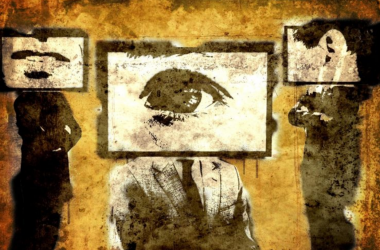By Kris Hermes
Originally posted on NLG
Kris Hermes has been an active, award-winning legal worker-member of the NLG and has been a part of numerous law collectives and legal support efforts. He is the author of Crashing the Party: Legacies and Lessons from the RNC 2000 (PM Press), which examined how Philadelphia helped develop and usher in today’s model of policing political protest. His book explains how activists and legal workers used a collective, defendant-led strategy to push back against the legal system and win.
Tilted Scales Collective, A Tilted Guide to Being a Defendant, Combustion Books, 2017. Paperback. 347 pages. $18.00.
A Tilted Guide to Being a Defendant was written for those political defendants and their supporters who want to stop the state from “[using] criminal charges to dismantle, destroy, and neutralize radical movements.”
The Tilted Scales Collective is made up of a small number of “dedicated legal support organizers who have spent years supporting and fighting for political prisoners, prisoners of war, and politicized prisoners.” The collective and the idea for A Tilted Guide were both borne out of conversations at an Anarchist Black Cross conference, combined with a strong determination to “help radicals and revolutionaries figure out how to protect themselves and their comrades when faced with state repression, while strengthening their movements advancing the fight for liberation.”1
In the U.S. legal system where more than 90 percent of criminal defendants plead guilty before trial—because there’s no way the system could sustain even a majority of defendants demanding a trial—prosecutors and defense attorneys alike are compelled to resolve criminal cases before going to trial. Prosecutors typically seek easy convictions. Defense attorneys and their clients are often backed into corners and forced to weigh an early guilty plea against a potentially costly trial and the prospect of much harsher punishment if convicted.
But what happens when activists and others are arrested and prosecuted on politically-motivated charges? The goals, interests, and considerations of activists or political defendants can be very different from the routine arrestees that are funneled through an odious, oppressive, and racist legal system.
It’s in the interest of activists to use the legal system to advance and strengthen their social movements and political goals. That often means politicizing the prosecution, using theatrics and other tactics to bring politics into the courtroom. One of the most common strategies used by political defendants to buck the system is to refuse plea bargains and demand jury trials.
A Tilted Guide is careful to underscore up front the collective’s framework for looking at political defendants. “[A]ll criminal charges [are] political,” states the Introduction. “[P]eople would not be in jail if private property and the state did not exist, and if racism, hetero-patriarchy, capitalism, and the like did not run our world.”
The Tilted Scales Collective is explicit in naming political defendants as those whom “the government targets as a threat to the ruling power structures and social orders,” including people arrested at a protest, charged with com- mitting an illegal act, swept up in a campaign of state repression, entrapped, or targeted while incarcerated.
While the Tilted Scales Collective is circumspect about the risks involved in fighting criminal charges and concedes that there are “many perfectly valid reasons to opt for a quick resolution,” the collective is also clear about the emphasis it places on the value of fighting charges and “getting some kind of victory out of the fight.”
We take inspiration from the many political prisoners and prisoners of war who have continued to engage in and contribute to their struggles despite the state’s best efforts to break their wills and isolate them from their communities and movements. Stories from our captured comrades are spread throughout this guide to show how much their struggles in court and in prison have strengthened and added to our movements. Their strength, resolve, and resilience show that people can figure out ways to handle their situations with dignity, integrity, and a commitment to the radical principles that made them targets of state repression in the first place.
Fortunately for political defendants, the National Lawyers Guild and its members have had a long tradition of fighting their charges. But there are many practicing attorneys who are generally unfamiliar with political cases and have little understanding of the motivations and goals held by their radical activist-clients. Even lawyers who consider themselves “movement attorneys” are often at odds with the legal and political strategies their clients want to employ. But, while A Tilted Guide might help lawyers to better understand their clients’ motivations, it was written for defendants with the promise of a forthcoming “companion guide for lawyers.”
In the meantime, A Tilted Guide to Being a Defendant can be used to supplement the advice of those criminal defense attorneys who are either too uninformed about litigating politicized cases or too motivated by other interests to help educate their clients on how to navigate the legal terrain as a political defendant and how to use certain legal strategies and tactics to fight back against the state.
Perhaps not since the Bust Book: What To Do Until the Lawyer Comes1 has there been as useful or helpful a tool for radical political defendants caught up in the criminal legal system.
How-tos for political defendants
A Tilted Guide opens with the chapter “On Being a Defendant,” which prepares political defendants for the often complicated and overwhelming criminal legal process. It reminds defendants that they are not alone, that support is available and accessible, and it covers how to talk about the case with comrades, loved ones, and the media.
One of the most important chapters of A Tilted Guide is the second, “Setting and Balancing Personal, Political, and Legal Goals,” which examines the need to respect all of the potential (and sometimes competing) interests of a political defendant. From being sincere about one’s limitations in doing prison time if convicted, to contemplating the political goals of defendants’ comrades and social movements, and the very real legal consequences of engaging in a political trial, A Tilted Guide pushes us to look at these different goals with an equitable and honest eye.
The following chapter on “Common Legal Situations” offers general advice on what to expect from the prosecution in addition to important information on grand juries, surveillance and infiltration, as well as the prevalence and use of conspiracy charges, entrapment, and terrorism statutes to undermine political movements.
The next three chapters review the important considerations for working with lawyers, co-defendants, and defense committees, which can be crucial to political, legal and emotional support throughout the prosecution.
The chapter on “Working with the Media” takes a rare look at utilizing the various forms of mainstream, independent, and social media to craft and seize the narrative. Without shying away from the risks associated with defendants putting themselves out in the public eye, A Tilted Guide addresses the importance of exploiting media opportunities and using the media strategically in order to advance defendants’ political and legal goals.
A Tilted Guide closes with chapters on “Resolving Your Case” and “Surviving in Prison.”
The chapter “Resolving Your Case” explains how a conspiracy against defendants permeates the criminal legal system in which “only around 5 percent of criminal cases make it to trial,” with the rest ending in plea agreements, or, on rare occasion, charges being dropped. Essentially, the deck is stacked against the vast majority of defendants, and especially political defendants. But, that doesn’t prevent defendants from exploiting possible legal or political points of leverage.
Sometimes, just the threat of going to trial produces sufficient leverage for the prosecution to dismiss a case or negotiate a more favorable plea agreement. But understanding the political vulnerabilities of key officials in positions of authority, and employing political strategies to shift public opinion can often significantly change the outcomes of criminal cases. Using certain legal strategies that serve to reveal the methods and motivations of the state as well as incorporate a political narrative into the case—both before and during a trial—can also have a positive effect favoring the plight of political defendants.
A Tilted Guide stresses the importance of not resolving one’s case at the expense of their co-defendants or political principles. In order to gain convictions and an upper hand, the state will often try to pit co-defendants against each other by encouraging cooperation with the prosecution. As such, A Tilted Guide encourages support for all defendants, despite (or perhaps because of) higher level charges imposed against some defendants, in order to avoid cooperating plea deals.
The chapter “Surviving in Prison” is a gem, with stories from our political prisoners and prisoners of war who have endured years behind bars in the U.S. and managed to retain their principles and their dignity. “[A] common theme,” declares the Tilted Scales Collective, “is that prison is a hard place that makes living difficult, especially living according to your revolutionary principles. Yet another theme is that staying connected to loved ones and radical movements is possible—doing so just takes a lot of sustained effort and internal fortitude.”
The invaluable comments in this chapter show how our political prisoners and prisoners of war “have managed to survive while maintaining their revolutionary ideals and their connections to radical struggle. Their continued commitment to struggle makes them an integral part of our movements and communities, and an inspiration to those of us on the outside.”
Some of the recommendations from the Titled Scales Collective and people who have weathered time in prison include staying true to one’s principles and integrity, developing one’s political knowledge, understanding, and skills, as well as staying connected to friends, loved ones, and supporters. According to Tilted Scales, it can also be important to maintain the legal fight from inside, but have reasonable expectations of success.
Even the appendix on “The Criminal Legal Process” is chock-full of helpful information in which the Tilted Scales Collective demystifies the criminal legal process and familiarizes defendants with the legal mechanisms of repression. From the secrecy of grand jury deliberations to the arraignment process and from the nuances of bail hearings to pretrial hearings and trial, the collective lays out helpful step-by-step explanations of a sometimes complicated and often terrifying process.
Much-needed guidance
Ever since the escalation of unrest that occurred after the 2014 murder of Michael Brown in Ferguson, MO, many Black Lives Matter organizers have been targeted, violently attacked, arrested and charged with felonies. Water protectors at Standing Rock, who endured violence by the state as well as private security companies, were charged with federal felonies and are facing years in prison for nonviolent protest. A Tilted Guide was written to help support defendants like these.
Most recently, on January 20, the day of Donald Trump’s inauguration, hundreds of protesters, journalists, legal observers, and bystanders were trapped and indiscriminately attacked by police using chemical and projectile weapons. Ultimately, more than 200 people were arrested and, in an unprecedented move, all were indicted on at least eight felonies each and face the potential of 75 years in prison if convicted on all charges.
J20 defendants, as they refer to themselves, are taking a page both figuratively and literally from A Tilted Guide in order to help them navigate dangerous legal terrain and to forge a collective legal strategy that aims to advance both their political and legal goals. Many of the defendants, some of whom have now read A Tilted Guide, agreed to work together under the banner #DefendJ20Resistance and to reject attempts by the state to coerce cooperation against fellow defendants.
Even some of the J20 defense attorneys have read A Tilted Guide. It has helped them better understand the organizing methods and motivations of their political clients. While the J20 attorneys have often been puzzled or frustrated by defendants’ actions, the learning process assisted by A Tilted Guide has been invaluable and insightful for everyone involved. In a situation fraught with peril, J20 defendants are very fortunate to have A Tilted Guide to refer to and use as a tool for fighting back against today’s form of political repression.
As political protesters and movement attorneys steel themselves for difficult times ahead with President Trump’s already exhibited intolerance of dissent, activists and lawyers alike can and should turn to A Tilted Guide as a real-world resource for navigating the rough terrain of politically-motivated prosecutions. Hopefully, in the coming months and years, A Titled Guide will strengthen the work of defendants and their attorneys in mounting effective strategies to mitigate legal harm and help advance our political struggles.
More than thirty years after radical activists wrote the Bust Book, A Tilted Guide brings a much-needed tool to radical activists at a time of increased political repression in the streets and in the courts.
_________________
NOTES
- Kathy Boudin, Brian Glick, Eleanor Raskin & Gustin Reichbach, BUST BOOK, WHAT TO DO UNTIL THE LAWYER COMES (Grove Press, 1970). Bust Book was published at a time of great unrest in the U.S. and, rather than the theoretical approaches commonly offered by the legal community, Bust Book offered practical approaches to political activists, arrestees and defendants for dealing with the state, whether on the street, in jail or in the courtroom.




